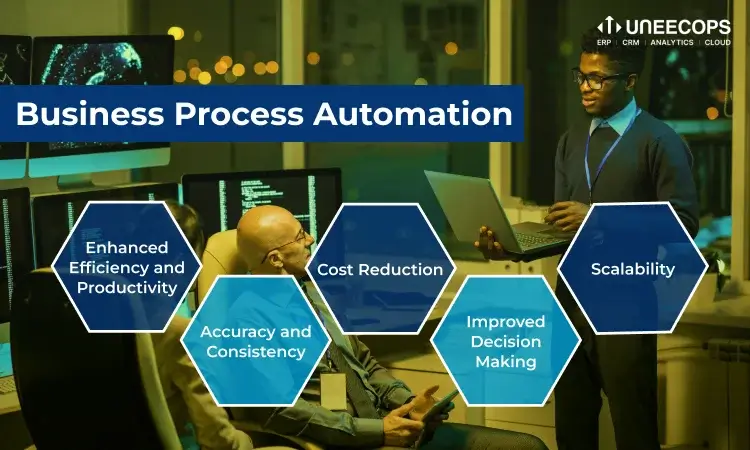In 2024, business process automation (BPA) is revolutionising business operations. This article delves into the key benefits of implementing process automation in businesses, highlighting how it revolutionises efficiency, accuracy, and overall performance in various business sectors.
Understanding Business Process Automation
At its core, business process automation can be understood as the deployment of tech for performing repetitive works or workflows in an enterprise where human labour can be minimised. This is done to cut down expenses, increment productivity, and synchronise workflows. The technology underpinning BPA has evolved, incorporating modern tech like AI and machine learning, which further enhance its effectiveness.
Primary Benefits of Business Process Automation
1. Enhanced Efficiency and Productivity
A key benefit of business process automation software is its boost to efficiency and productivity. By using automation software to handle routine along with energy intensive works, workers are libertified to dedicate themselves to more thoughtful, value-added activities.
2. Accuracy and Consistency
Process automation minimises the odd chances of faults that are usually seen in case of manual work. Automation checks that the deliverables are undertaken chronologically with high accuracy, leading to higher quality outcomes and reliability in business processes.
3. Cost Reduction
Implementing BPA can result in significant revenue-holding for organisations. By implementing process automation, companies can reduce the need for manual labour, thereby cutting down on labour costs. Additionally, the increased accuracy and productivity aids in minimization of expenses incorporated with fallacies and incompetencies.
4. Improved Decision Making
Advanced automation software enables more efficient data analysis. This enhanced data processing capability leads to better business intelligence, aiding in more informed and timely decision-making.
5. Scalability
BPA solutions, particularly automation software, are scalable and adaptable. This scalability ensures that the automation solutions remain effective and efficient, regardless of the size or complexity of the business.
Read More: 8 Effective Strategies to Implement Business Process Management
Business Process Automation Using ERP and CRM Systems
ERP Automation with SAP
SAP provides robust solutions for ERP Automation. By implementing SAP’s business process automation software, businesses can automate a wide range of ERP workflows, from supply procurement to auditing. This automation leads to streamlined workflows, lower executional expenses, and fortified information efficiency. SAP excels in ERP automation, integrating various business functions cohesively, ensuring that all departments work in harmony and that decision-making is based on comprehensive, real-time data.
CRM Automation with Salesforce
Salesforce, a prominent name in customer relationship management, plays a crucial role in CRM Automation. Leveraging Salesforce’s business process automation software for CRM Automation allows businesses to automate critical customer-related processes, such as sales tracking, customer service, and marketing campaigns. CRM automation enhances operations and customer engagement. Salesforce’s advanced analytics and personalised customer interactions ensure that businesses can build stronger, more meaningful relationships with their clients.
Streamlining Operations with SAP Business Process Automation
SAP Business Process Automation
In the realm of BPA, SAP Business Process Automation stands out as a pivotal tool, especially for large-scale enterprises. This sophisticated form of automation software integrates seamlessly with existing SAP systems, enhancing the overall efficiency of business operations. By leveraging SAP’s robust platform, businesses can automate complex processes across various departments, from finance to human resources, ensuring a harmonious and efficient workflow.
Tailored Automation Solutions
What sets SAP Business Process Automation apart is its ability to offer tailored solutions that cater to the unique needs of each business. This customization ensures that every aspect of the business process is optimised, leading to improved performance and a significant reduction in operational bottlenecks.
Future-Stabilising Businesses
Incorporating Business Process Automation is a systematic step in the direction of securing the long-term existence of a business. As market dynamics evolve and technological advancements emerge, having a flexible and adaptable process automation system is crucial. SAP’s ERP automation solutions adapt and scale, ensuring business agility and competitiveness in a rapidly changing market landscape.
How Technologies Are Changing the Game of Business Process Automation from Rigid to Robust
Definitely yes, the automation has undeniably become a cornerstone of success for modern enterprises, propelling efficiency and productivity to new heights while enhancing the overall quality of results. Technologies like AI, ML and IoT are bringing new dimensions to automation by filling the gaps. An exciting synergy emerges with Artificial Intelligence (AI), which mimics human cognitive functions, and Business Process Automation (BPA), specializing in automating mundane and repetitive human tasks.
Together AI and BPA are redefining the essence of business processes and making them more efficient, precise, and cost-effective. Such technologies are more than mere buzzwords. They are like a transformative wave in the business landscape. By harnessing the potential of AI-driven innovations and advanced data analytics, more informed decisions can be made which is helping BPA to reach goal of automating and simplifying workflows, amplify growth and navigate rapidly in market with agility and intelligence.
AI and ML
The incorporation of AI and ML in BPA tools has opened new avenues for process improvement. These technologies enable the automation of more compound works and deduce details that were earlier unidentifiable.
Internet of Things (IoT)
Speed and real-time information foster better and informed decision making. Devices connected to the IoT can measure and monitor data in real time; through machine learning algorithms. By connecting various devices and detectors, IoT enables the accumulation of live information, those could be used to automate and optimise various business processes.
Creating Business Process Value with Uneecops
Business process automation brings with it a lot of benefits for your organization, right from rethinking your business workforce to automating repetitious processes. Having said that, yes business process automation in 2024 stands as a pivotal element in the strategic development of businesses across various sectors. But every organization needs to closely consider every aspect of BPA to reap the best results out of it. Its integration with systems like ERP and CRM, coupled with advancements in AI and IoT, has not only streamlined operations but also opened new opportunities for growth and innovation.
While getting started with process automation might feel a bit daunting, it’s important to remember the extent to which this can transform your organization. A business process automation solutions provider like Uneecops could help you achieve that. With our seasoned experience, we guide you in a way that you receive both the external and internal benefits. By thoroughly understanding the business requirements our experts help in laying down the BPA strategy for automating processes and workflows that focus on specific business outcomes. Hence, helping business achieve complete automation of processes that meet the desired goals and yield the required benefits in terms of profitability or cost-cutting. Want to know more about how we can help you thrive with BPA?







